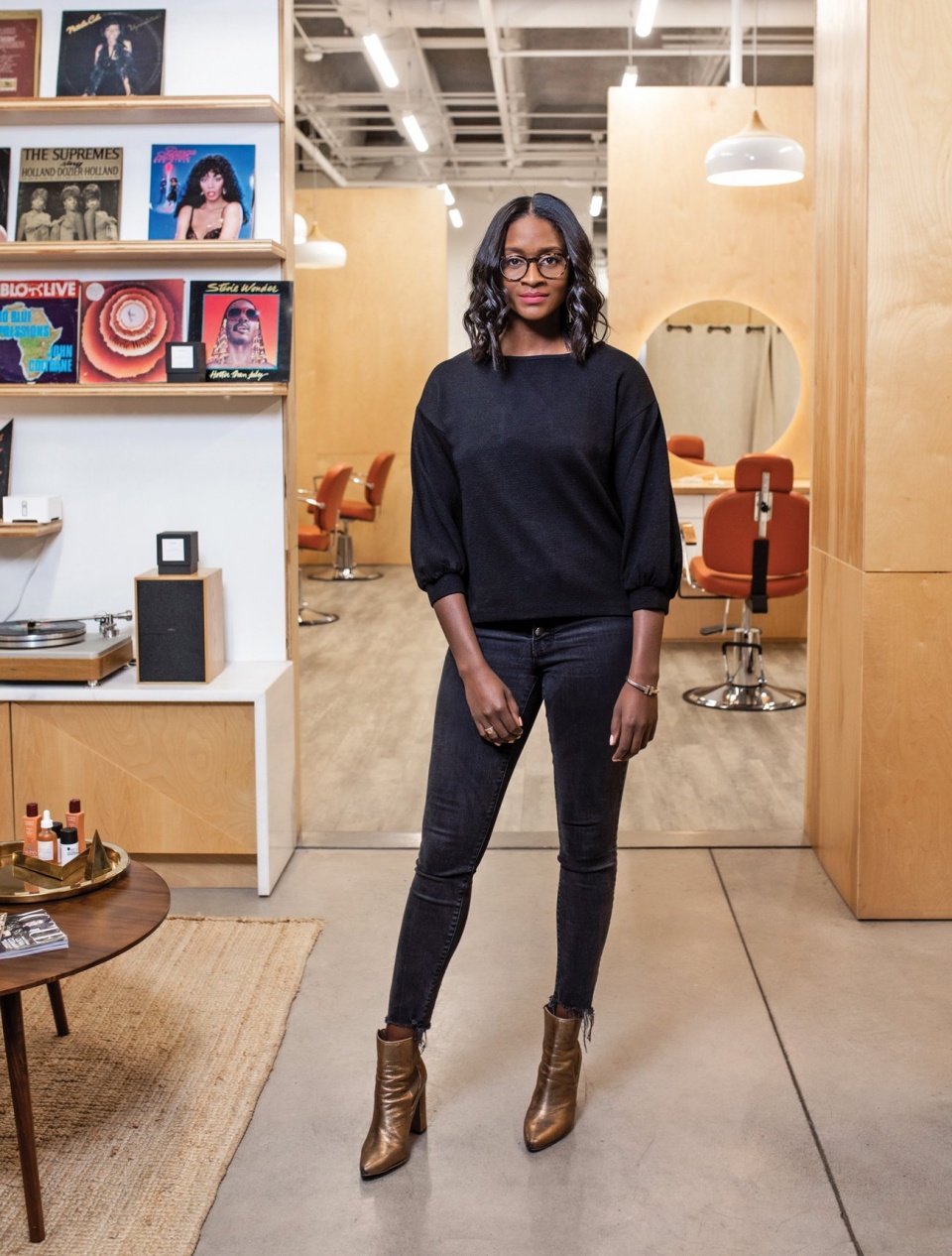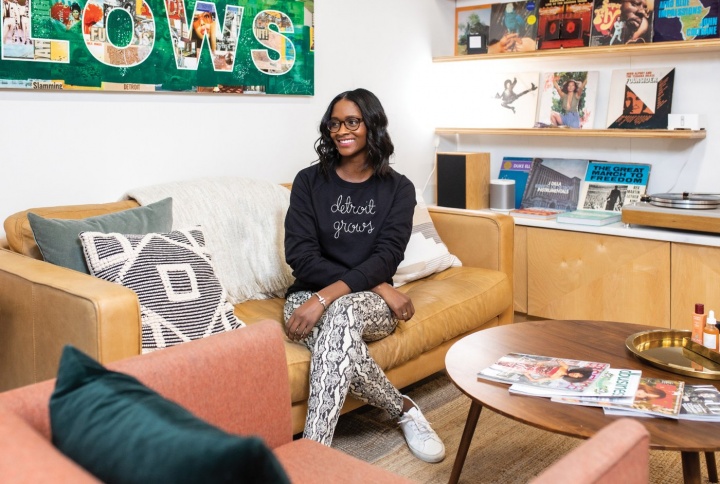A Detroit entrepreneur reinvests in her hometown.
Columbia College | Columbia University in the City of New York
A Detroit entrepreneur reinvests in her hometown.

Kat Stevenson
“I think when you leave a place and you see that it’s suffering when you’re not there, there’s a little bit of latent guilt that starts to set in,” Batts muses.
Now Batts has come home to make Detroit — and its residents — shine, by taking a radically inclusive approach to beauty, entrepreneurship and philanthropy. Detroit Blows, the salon Batts started with business partner Katy Cockrel and investor Sophia Bush, was founded on the idea that beauty could (and should!) be accessible to, inclusive of and beneficial to the community.
The premise is simple: a salon at which women of all races and hair types and textures can receive services by knowledgeable technicians, and from which a percentage of profits are reinvested into the community through the company’s philanthropic arm, Detroit Grows. The salon, which opened in October 2017, quickly made national headlines, with write-ups in women’s and general interest magazines (Marie Claire and People), in business magazines (Forbes) and on beauty websites (Refinery 29). The business partners landed on People’s “25 Women Changing the World of 2018” list and in, 2019, Batts appeared on Inc.’s list of “100 Women Building America’s Most Innovative and Ambitious Businesses.” And as word spread about Detroit Blows, so did its influence on the community.

Kat Stevenson
Batts’s idea for Detroit Blows was born from her experience as a commuter to her own hometown.
At the time, Batts was based in NYC as Viacom’s head of strategic partnerships and social innovation, helping nonprofits and large corporations highlight their philanthropic work. After being assigned to a Detroit-based automotive company account, she started traveling regularly to the Motor City. And that’s when she noticed a problem — Batts, who is African American, couldn’t find a convenient salon downtown that could style her hair. “I would go to the Detroit suburbs and spend my money there,” she says, “then come back to the automotive company and talk about how we had to keep dollars in the city. The hypocrisy, after a while, wasn’t lost on me.”
Looking for solutions, she connected with her childhood friend Cockrel, who is biracial and is a communications and public relations specialist in Detroit. The pair realized that a downtown salon with stylists who could expertly handle multiple hair types would fill a sorely needed niche. Batts’s best friend, actress Bush (who is white), came on as the first investor. “We knew that we wanted to create an inclusive model because salons have traditionally been segregated spaces,” Batts says. “We wanted to go someplace where I could get my hair done, she could get her hair done, everyone could get their hair done and we could begin to dismantle this idea that you only want to be serviced by someone who looks similar.”
“It was a much larger opportunity to think about
the role that beauty can play in a conversation
around community revitalization, around identity politics,
around consumer-packaged goods.”
The partners soon secured a location in a diverse part of downtown and, within two years of its opening, their goal had been realized: “You see women in our salon sitting next to each other who, historically, have never sat next to each other in a salon,” Bush said last October, appearing on a panel at the Forbes “Under 30 Summit” in Detroit. “It is creating an intersectional awareness and community that, to us, is paramount.”
Detroit Blows offers blowouts, up-dos and curly-hair friendly styles, as well as other services like manicures and waxing, using all non-toxic products. (Batts notes she and the staff chose their products by testing on themselves: “Everybody on our leadership team had a different hair type, and so we were able to take products home, use them and then talk about how they worked.”) By funneling $1 from every blowout and a portion of all retail sales into Detroit Grows, the founders began to put their profits back into the community.
“For us, it was a much larger opportunity to think about the role that beauty can play in a conversation around community revitalization, around identity politics, around consumer-packaged goods,” Batts says. “We’re understanding the power that we, as consumers, have to direct those dollars toward what it is that we want to see.”

Kat Stevenson
In addition to micro-grants, the team also works with for-profit businesses to offer entrepreneurship grants; Detroit Grows recently partnered with the female-founded social networking and dating site Bumble to award four women-run local businesses grants ranging from $2,500 to $10,000. “Economists talk about the multiplier effect — if you invest in women and girls, that investment goes further,” says Batts. “It’s an investment in their families, it’s an investment in their communities, it’s an investment in the idea that women matter and their ideas matter and are important.”
In interviews, Batts is confident and passionate. She sees her city healing and says she’s excited to be part of “that energy and grittiness and maker culture” that has always defined Detroit. The hometown salon has also given Batts a chance to make a statement about defining beauty. She stresses that Detroit Blows wants to move “beyond the blowout” (the company motto) and redefine how “beautiful hair” is seen.
“It’s an opportunity for us to acknowledge that beauty, for us from a hair standpoint, is not just straight,” she says. “Straight hair is not just the beautiful hair, it’s whatever you want your hair to do that day … We are at the moment just one small salon in Detroit, but we’ve been able to become a part of a national discourse.”

Published three times a year by Columbia College for alumni, students, faculty, parents and friends.
Columbia Alumni Center
622 W. 113th St., MC 4530, 6th Fl.
New York, NY 10025
212-851-7852
cct@columbia.edu

Columbia Alumni Center
622 W. 113th St., MC 4530, 4th Fl.
New York, NY 10025
212-851-7488
ccalumni@columbia.edu